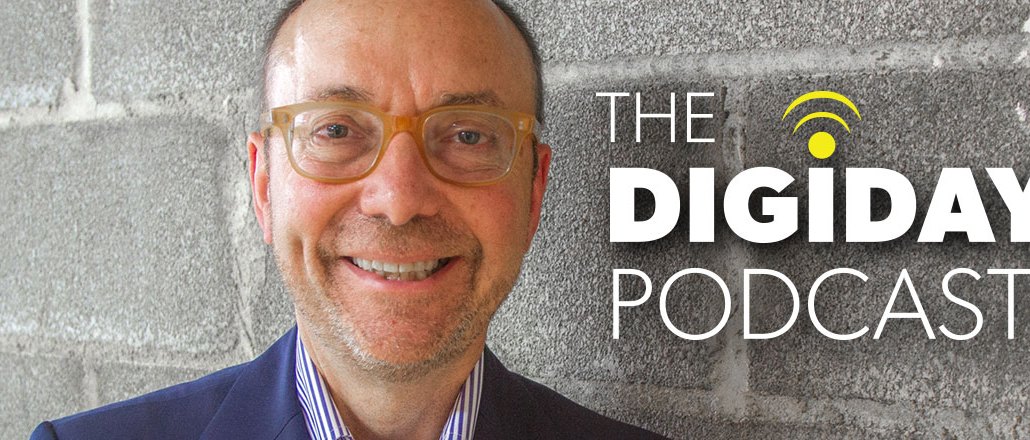Secure your place at the Digiday Media Buying Summit in Nashville, March 2-4

Subscribe: iTunes | Stitcher | RSS
The Association of National Advertisers long-awaited report on lack of transparency in the media industry cast much of its blame on the convoluted way the industry is structured, giving cover to bad practices.
But for Interactive Advertising Bureau CEO Randall Rothenberg, clients themselves need to shoulder a good part of the blame for problems in the system. It is their responsibility, in his view, to be more technologically adept and to manage all of their partners, from agencies to ad tech providers.
“It’s either a willful shirking of their responsibility to understand the work of their vendors and their vendors’ vendors, or it’s a wink-wink, nudge-nudge to offload responsibility in their quest for ever-lower prices,” he said on this week’s episode of the Digiday Podcast.
The reality is the modern media world is complicated, and it’s not going back to the days of old when audiences were easy to reach with a straightforward TV buy. Now, mastering tech is simply part of the job. And marketers can’t outsource that.
“The problem begins with the unwillingness of major marketers to insource significant, senior-level technical expertise,” he said. “It begins with them.”
Below are highlights from the episode, lightly edited for clarity.
Digital media’s openness is a blessing and a curse.
The Internet advertising industry sprung up based on the open Internet. That allowed anyone to set up shop and start a media company and reach an audience. But it also allowed many of the downsides of an open system: fraud, viruses, bad actors. The current trend to concentration of ad spending to the top players should be seen in that context, Rothenberg said.
“You’re seeing a reversion to a mean,” he said. “One of the reasons you’re seeing a reliance on a handful of players is they’re seeking safe havens. Back in the old days nobody got fired for buying IBM. Now nobody got fired for buying Google and Facebook.”
But that doesn’t mean the current situation is a permanent one. After all, three TV networks got essentially 100 percent of TV advertising in the 1950s. Courses correct. “If you look at the history of media,” Rotheberg said, “there’s a tendency to consolidation. History has shown that government and technology can change in ways that will upend the dominance. It’s all a little bit hype driven and overblown.”
Publishers can, in fact, compete against Google and Facebook
There’s a current “meme,” as Rothenberg calls it, that Google and Facebook are sucking up three-quarters of new digital ad spending. With their deep troves of consumer data, publishers are left to fight over the scraps. The notion publishers can’t compete on data is “ludicrous” to Rothenberg.
“Any given internet-based operation has equivalent amounts of data on its own audience on its own site,” he said. “It’s the same as an independent magazine publisher in 1985 could still compete with Time Inc, Hearst and Conde Nast.”
Ad-block software makers are ‘thieves’
Rothenberg allows that advertisers and publishers have to focus on the user experience much more when it comes to advertising. But he has no time for for-profit ad block software makers. He’s on record calling them everything from “pissants” to “profiteers.” Rothenberg’s strident comments struck some as misguided, but he’s not ready to soften his tone.
“They’re thieves,” he said. “To create for-profit businesses whose aim is to divert money from legitimate business transactions is the textbook definition of extortion. Whether it’s legal is up to the courts. I’m saying morally and ethically they’re beyond the pale and ought to be impaled. They’re bad, rich, cynical, asshole dudes in Germany and Israel who are trying to steal money from publishers. Period.”
Blocking ad-block users is ‘extraordinarily effective’
The IAB has pushed publishers to take a two-pronged approach to ad blocking. One part — known as DEAL — is to figure out how many visitors are using ad blockers, ask them to turn them off and ultimately limit their access. The second part is around improving the user experience by focusing on lighter, less intrusive ads. The tough love approach of DEAL is showing a lot of promise, Rothenberg said, with 40-60 percent success rate for getting ad-block users to turn off their ad blockers.
“There tends to be a hard-core group of consumers who employ ad-block software who won’t turn it off under any circumstances,” Rothenberg said. “They tend to be the same kind of audience that is the hard-to-reach audience for other media: Young men.”
Publishers can’t blame others for bad user experiences
There can be a feeling among publishers that so many of the problems they face are out of their control. Making money is hard. Ad are served through third-parties. But that’s a cop out, according to Rothenberg, who believes publishers need to take responsibility for not just parts of the ad experience they control but what others do on their behalf.
“You are responsible for the supplier you are hiring,” he said. “If we create that chain of responsibility, you clean it up.”
More in Media

Digiday+ Research: Dow Jones, Business Insider and other publishers on AI-driven search
This report explores how publishers are navigating search as AI reshapes how people access information and how publishers monetize content.

In Graphic Detail: AI licensing deals, protection measures aren’t slowing web scraping
AI bots are increasingly mining publisher content, with new data showing publishers are losing the traffic battle even as demand grows.

In Graphic Detail: The scale of the challenge facing publishers, politicians eager to damage Google’s adland dominance
Last year was a blowout ad revenue year for Google, despite challenges from several quarters.





